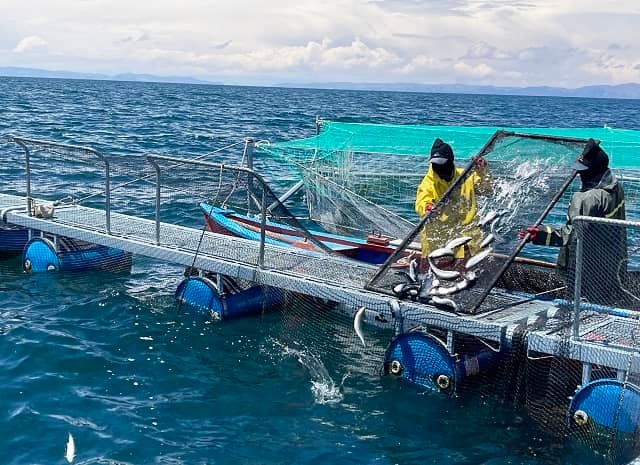
The growing global population demands more food, and aquaculture is rising to the challenge. As the fastest-growing food production sector, aquaculture provides a vital source of protein and nutrients. However, rapid expansion can raise environmental and social concerns.
To address these concerns and promote sustainable growth, the Food and Agriculture Organization (FAO) has developed the Guidelines for Sustainable Aquaculture (GSA). The Guidelines consist of three sections: A) vision, objectives, scope, and guiding principles; B) guidelines to promote sustainable aquaculture; and C) implementation and monitoring.
- 1 The Vision: A Sustainable and Equitable Future for Aquaculture
- 2 The Objectives: Achieving Sustainability in Three Dimensions
- 3 Key Principles for Sustainable Aquaculture Practices
- 4 Implementing the GSA: A Shared Responsibility
- 5 A Framework for Continuous Improvement
- 6 Conclusion: A Sustainable Future for Aquaculture
- 7 Entradas relacionadas:
The Vision: A Sustainable and Equitable Future for Aquaculture
According to the document, “The Guidelines are voluntary, have a global scope, apply to diverse contexts, systems, scales, species, environments, and aquaculture activities, and recognize links with sectors such as fisheries, agriculture, forestry, wildlife, tourism, energy, mining, and transportation.” In this sense, the GSA envisions an aquaculture sector that significantly contributes to:
- Global food security: Ensuring that everyone has access to nutritious food.
- Improved living standards: Enhancing the livelihoods of all actors in the aquaculture value chain, including small farmers and marginalized groups.
The Objectives: Achieving Sustainability in Three Dimensions
The GSA promotes a holistic approach to sustainability, focusing on three key dimensions:
- Economic sustainability: Ensuring the sector is profitable and supports economic development.
- Social sustainability: Promoting fair labor practices, gender equality, and social responsibility.
- Environmental sustainability: Minimizing environmental impact and ensuring responsible resource management.
Key Principles for Sustainable Aquaculture Practices
The Guidelines are based on principles, norms, and sustainable development practices consistent with the 2030 Agenda and its relevant Sustainable Development Goals, and other instruments of great interest to the sustainable development of aquaculture, namely:
- Sustainability: Striving for economic, social, and environmental sustainability, animal health and welfare, and the viability of aquaculture through governance frameworks and strategies that reflect local, national, or regional realities and are climate-smart and socially, economically, and environmentally favorable.
- Environmental management: Using the natural environment responsibly and protecting it through conservation and sustainable practices aimed at fostering ecosystem resilience and people’s well-being in a measurable way.
- Rule of law: Enacting widely known laws and regulations that apply to all equally through an independent judiciary, compatible with obligations imposed by national, regional, or international law, and duly considering voluntary commitments under applicable regional and international instruments.
- Non-discrimination and respect for cultures: Promoting the elimination of all forms of discrimination in aquaculture policies and practices, and recognizing and respecting existing organizational forms, traditional and local knowledge, and practices of aquaculture communities.
- Equity and equality: Promoting justice and fair treatment—both legally and practically—for all, including the enjoyment of all human rights, resorting to affirmative action or preferential treatment when necessary, to achieve equitable outcomes and equal opportunities, particularly for women, youth, vulnerable and marginalized groups, indigenous communities, ethnic minorities, small-scale aquaculturists, and people with disabilities.
- Consultation and participation: Ensuring the free, effective, and informed participation of all stakeholders in aquaculture decision-making, promoting strong partnerships among different actors, and establishing conflict resolution mechanisms, taking into account existing power imbalances between different individuals and groups.
- Transparency and accountability: Clearly defining, widely disseminating, and making available policies, laws, regulations, procedures, and decisions that hold individuals, public institutions, and non-state actors accountable for their actions and decisions according to the principles of the rule of law.
- Holistic and integrated approaches: Recognizing, adopting, and applying the ecosystem approach to aquaculture as a key strategy for integrating aquaculture activities into the broader ecosystem in a way that fosters sustainable development, equity, and resilience of interrelated socio-ecological systems, ensuring effective coordination among relevant sectors and reconciling economic, social, and environmental objectives; and ensuring the integration of aquaculture into a sustainable food systems approach.
The GSA outlines the steps both governments and stakeholders must take to implement these principles:
- Policies and planning: Governments must develop clear policies and regulations for the sustainable development of aquaculture.
- Sustainable practices: Farmers must adopt practices that minimize environmental impact and conserve resources.
- Collaboration: States and stakeholders must work together to share knowledge, create partnerships, and access funding for sustainable development.
A Framework for Continuous Improvement
Recognizing the dynamic nature of aquaculture, the Guidelines for Sustainable Aquaculture (GSA) are designed to be adaptable and periodically updated. This ensures that the guidelines remain relevant and address emerging issues in the sector.
Conclusion: A Sustainable Future for Aquaculture
The GSA provides a comprehensive framework for all stakeholders involved in aquaculture. By following these guidelines, we can ensure a thriving fish farming industry that contributes to global food security, promotes social well-being, and protects our environment for future generations.
Reference (open access)
Committee on Fisheries. Thirty-sixth Session, 8-12 July 2024. Guidelines for Sustainable Aquaculture. 36 p.
Stay Always Informed
Join our communities to instantly receive the most important news, reports, and analysis from the aquaculture industry.
Editor at the digital magazine AquaHoy. He holds a degree in Aquaculture Biology from the National University of Santa (UNS) and a Master’s degree in Science and Innovation Management from the Polytechnic University of Valencia, with postgraduate diplomas in Business Innovation and Innovation Management. He possesses extensive experience in the aquaculture and fisheries sector, having led the Fisheries Innovation Unit of the National Program for Innovation in Fisheries and Aquaculture (PNIPA). He has served as a senior consultant in technology watch, an innovation project formulator and advisor, and a lecturer at UNS. He is a member of the Peruvian College of Biologists and was recognized by the World Aquaculture Society (WAS) in 2016 for his contribution to aquaculture.







